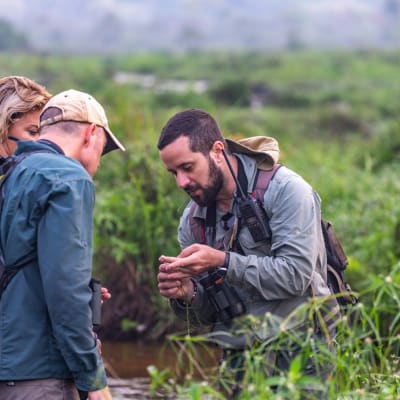
Vaccinations for your trip to Congo
What You Need to Know
What You Need to Know
Traveling to the Republic of Congo offers incomparable nature experiences and cultural highlights, but requires careful planning, especially in terms of health precautions. The Congo, a tropical region with unique flora and fauna, also presents increased risks for infectious diseases like malaria, yellow fever, and hepatitis. The hygienic conditions and medical facilities on-site often do not meet European standards, further increasing the risk of diseases.
Thorough travel medical preparation with the right vaccinations is therefore essential to minimize health risks and ensure a safe stay. This article highlights the most important aspects of vaccination and health precautions for a trip to the Congo and provides practical tips on how to optimally prepare to enjoy your journey.
- Mandatory vaccinations for traveling to the Congo
- Recommended vaccinations for Congo travelers
- Malaria prophylaxis in the Congo: Protection against one of the greatest health threats
- Assembling a first aid kit for the Congo
- Access to medical care in the Congo
- Conclusion: Health comes first – Traveling to the Congo well prepared


Mandatory vaccinations for traveling to the Congo
A yellow fever vaccination is mandatory for entry into the Republic of Congo. This measure protects not only travelers but also helps contain yellow fever outbreaks in the region. The Congo is among the yellow fever endemic areas, so strict adherence to this rule is indispensable.
Yellow fever vaccination: Key points at a glance
The yellow fever vaccination is compulsory for all travelers aged 9 months and must have been administered at least 10 days prior to entry. Proof is given through the international vaccination certificate, which will be checked upon crossing the border. A one-time vaccination provides lifelong protection and is considered valid documentation in international travel. Children under 9 months are exempt from the vaccination requirement.
Travelers who cannot receive the vaccination for medical reasons require a multilingual vaccination exemption certificate to still be allowed entry. It is important that the yellow fever vaccination is performed only at authorized vaccination sites to comply with international standards.
In addition to the yellow fever vaccination, depending on the duration of stay and individual risk factors, other vaccinations may also be advisable. A tropical medicine specialist or travel physician can help develop the appropriate preventive strategy for a safe trip to the Congo.
Recommended vaccinations for Congo travelers
For travel to the Congo, comprehensive vaccination protection is essential to protect against serious infectious diseases. In addition to the mandatory yellow fever vaccination, which is required for all travelers aged nine months and older, there are additional vaccinations that are highly recommended, depending on the travel route, duration of stay, and individual risks.
Vaccinations against hepatitis, typhoid, and meningitis
A hepatitis A vaccination is advisable for all travelers, as the risk of infection from contaminated food and drinking water is high. The typhoid vaccination is also important, especially for those traveling in regions with poor hygiene conditions. For long-term stays or trips with close social contacts, a hepatitis B vaccination is also recommended, as it provides protection against transmission through blood or other bodily fluids.
The meningococcal vaccination is particularly noteworthy, as the Congo lies in the African meningitis belt. This vaccination is especially important during the dry season from December to May, when the risk of transmission is heightened. Additional vaccinations, such as against rabies and cholera, may be necessary in rural areas or with close contact with wildlife and poor hygiene.
Special considerations for risk groups
For children, pregnant women, and older adults, the vaccination strategy requires special care. Children should keep all standard vaccinations such as measles and rubella up to date; however, the yellow fever vaccination is only approved from the age of nine months. Pregnant women are advised against live vaccines such as yellow fever, so a medical certificate is necessary in such cases. Instead, vaccinations against hepatitis A and B as well as typhoid may be considered.
Older travelers should check their vaccination status and get boosters, such as for tetanus and diphtheria. Since they have a higher risk for severe illness, additional vaccinations, such as against pneumococci, may be advisable. For all risk groups, early travel medical consultation – ideally at least six weeks before departure – is crucial to address individual needs and ensure optimal protection.
Particular attention should always be paid to malaria prophylaxis and effective protection against mosquito bites, as these measures can significantly reduce the risk of severe illnesses.
Malaria prophylaxis in the Congo: Protection against one of the greatest health threats
Malaria presents one of the biggest health risks for travelers in the Congo, as the disease is prevalent nationwide, including in urban areas. Effective malaria prophylaxis combines medication and physical protection measures to minimize the risk of infection.
Medications for malaria prevention
For medical prophylaxis, common preparations such as Atovaquone/Proguanil (e.g., Malarone®), Doxycycline, or Mefloquine (e.g., Lariam®) are recommended. The choice of the appropriate medication should always be made in consultation with a tropical or travel medicine specialist, as individual factors such as health status, duration of travel, and potential side effects need to be considered.
Prophylaxis should begin a few days before entering the Congo and should be continued consistently throughout the stay. Depending on the medication, a follow-up period of 1 to 4 weeks after returning may be required to ensure complete protection.
Additional mosquito protection measures
In addition to taking medications, avoiding mosquito bites plays a central role in malaria protection. Exposure measures include wearing long, light-colored clothing that covers as much skin as possible, especially in the evenings. Regular application of insect repellents with active ingredients such as DEET, Icaridin, or PMD to uncovered skin areas offers additional protection.
In accommodations, travelers should sleep under impregnated mosquito nets and, if necessary, use mosquito sprays or electric vaporizers. Fly screens on windows and doors, as well as staying in air-conditioned rooms, also help avoid mosquito bites.
The combination of medical prophylaxis and physical protection measures is crucial to significantly reduce the risk of malaria infection in the Congo. These strategies also protect against other mosquito-borne diseases such as dengue or chikungunya.
Assembling a first aid kit for the Congo
A carefully assembled first aid kit is indispensable for a safe stay in the Republic of Congo. The tropical conditions and limited medical care in many areas necessitate thorough preparation. With the right supplies, you can minimize health risks and quickly respond in emergencies.
Medications for common illnesses
For a trip to the Congo, specific medications and vaccinations are essential. Key items include preparations for malaria prophylaxis, as the Congo is a high-risk area for malaria. Pain and fever medications like paracetamol or ibuprofen, as well as medications for diarrhea, such as loperamide or electrolyte powder, should not be missing from the first aid kit. Antihistamines provide protection against allergic reactions, while antibiotics should be prepared after consultation with a doctor for serious infections.
It is also advisable to pack water purification tablets, as clean water is often hard to come by. A mosquito net with fine mesh not only protects against malaria but also against other insect-borne diseases like dengue or chikungunya.
First aid equipment
An extended first aid kit is particularly crucial when traveling to remote areas. Plasters in various sizes, sterile compresses, gauze bandages, and elastic bandages should always be included. Supplement your supplies with disinfectants, a small pair of scissors, tweezers, and a thermometer. For wounds or larger injuries, antiseptic solutions and suturing materials can be invaluable.
High SPF sunscreen and hand sanitizers are also essential components of a first aid kit. To be prepared for longer stays or unexpected delays, pack sufficient supplies and carry all prescription medications in their original packaging along with a doctor's note.
With a well-prepared first aid kit, you can tackle many of the health challenges in the Congo and enjoy your trip with peace of mind.
Access to medical care in the Congo
Medical care in the Republic of Congo shows significant differences between urban and rural areas. Overall, it is far from meeting international standards, making careful planning and precautions for travelers indispensable.
Medical facilities in urban areas
In larger cities like Kinshasa or Lubumbashi, the few available health facilities and medical professionals are concentrated. Travelers can generally access basic healthcare in urban centers, but the quality and availability remain limited. A severe shortage of staff and equipment complicates comprehensive care. Emergency capacities are limited, so serious illnesses or injuries often necessitate medical evacuation.
Health care in rural areas
The situation in rural regions is even more precarious. Many areas lack health infrastructure, and the few existing facilities are often hard to reach. Great distances, poor transportation options, and a shortage of medical personnel make it almost impossible to obtain timely medical assistance. Innovative approaches such as mobile health teams or training local health workers aim to provide relief, but access remains restricted for many people.
For travelers, this means that good emergency planning is essential. Comprehensive travel insurance that also covers medical evacuations, as well as carrying a well-stocked first aid kit, can be life-saving in emergencies.
Conclusion: Health comes first – Traveling to the Congo well prepared
Traveling to the Congo is an adventure that requires careful health preparation. From the yellow fever vaccination, which is mandatory for entry, to recommended protective measures such as malaria prophylaxis and additional vaccinations against typhoid or hepatitis – the right precautions significantly minimize health risks.
In addition to vaccinations and mosquito protection, it is essential to address the limited medical options in the country. Comprehensive travel health insurance, which also covers medical evacuations, offers additional security. Travelers should begin planning 4-8 weeks before departure and seek individual advice from tropical or travel medicine specialists.
Reliable information can be found from official health authorities such as the Foreign Office, tropical institutes, and international organizations like the WHO. Combined with personal consultation and the right preventive measures, nothing stands in the way of a safe and unforgettable trip to the Congo.
Experience the magic of Africa with experts who have explored every corner themselves
Your dream holiday, tailor-made by experts.
Our travel consultants not only admire Africa from afar, but also explore the most impressive regions every year to experience the cultures, landscapes and experiences, such as gorilla trekking, at first hand.
From your first enquiry to your return home, we are there for you personally - by phone, email or WhatsApp, whenever you need us. Immerse yourself in the world of gorillas, experience the beauty of Africa and create memories that will last a lifetime. Let's create your next great adventure together!
Experts for your Africa trip




